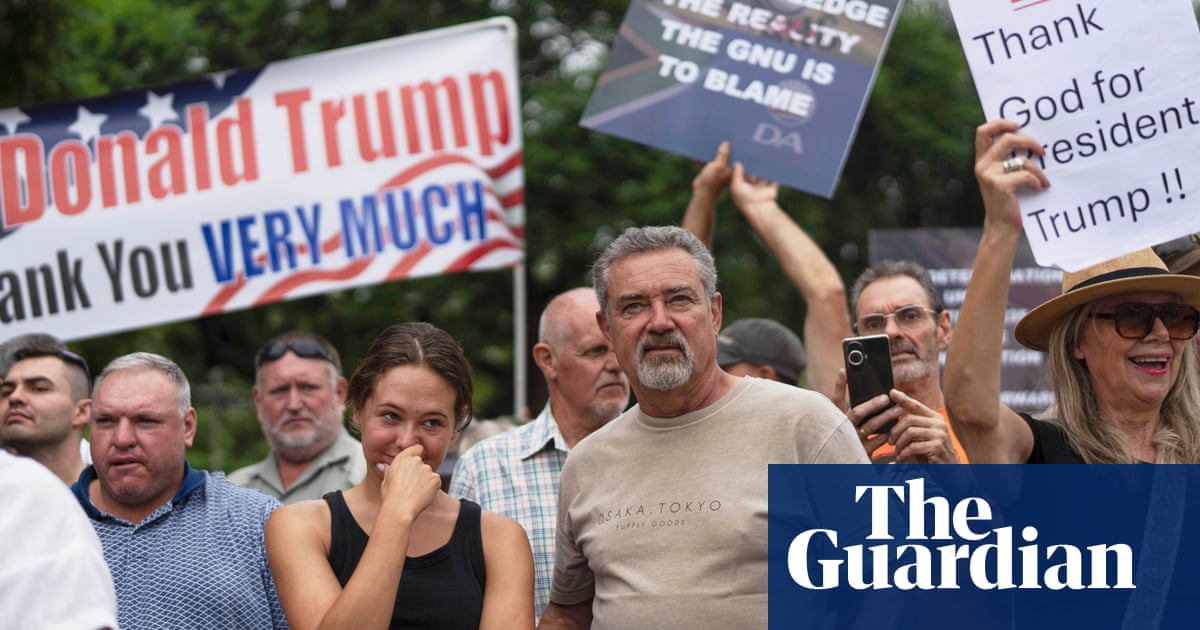A group of 49 whiteSouth Africansdeparted their homeland on Sunday for the United States on a private charter plane having been offered refugee status by theTrump administrationunder a new program announced in February.
The group, which included families and small children, was due to arrive at Dulles international airport outside Washington DC on Monday morning local time, according to Collen Mbisi, a spokesperson for South Africa’s transport ministry.
They are the first Afrikaners – a white minority group in South Africa – to be relocated afterDonald Trumpissued anexecutive orderin February accusing South Africa’s Black-led government of racial discrimination against them and announcing a program to offer them relocation to the US.
The South African government said it is “completely false” that Afrikaners are being persecuted.
The Trump administration has fast-tracked their applications whilepausingother refugee programs, halting arrivals from Afghanistan, Iraq, most of sub-Saharan Africa and other countries in a move being challenged in court.
Refugee groups have questioned why the white South Africans are being prioritized ahead of people from countries wracked by war and natural disasters. Vetting for refugee status in the US often takes years.
TheTrump administrationsays the South African government is pursuing racist, anti-white policies through affirmative action laws and a new land expropriation law it says targets Afrikaners’ land. The government says those claims are based on misinformation and there is no racism against Afrikaners and no land has been expropriated, although the contentious law has been passed and is the focus of criticism in South Africa.
Trump himselffalsely claimedto reporters South Africa’s leaders were “taking away land, they’re confiscating land”.
As the Financial Times columnist Simon Kuperpointed outlast year, several of the most influential voices around Trump “are fiftysomething white men with formative experiences in apartheid South Africa”.“Elon Musk lived in apartheid South Africa until he was 17. David Sacks, the venture capitalist who has become a fundraiser for Donald Trump and a troll of Ukraine, left aged five, and grew up in a South African diaspora family in Tennessee. Peter Thiel spent years of childhood in South Africa and Namibia, where his father was involved in uranium mining as part of the apartheid regime’s clandestine drive to acquire nuclear weapons,” Kuper wrote.
South Africa also denies US claims that Afrikaners are being targeted in racially motivated attacks in some rural communities. Instead, the South African government said Afrikaners – who are the descendants of Dutch and French colonial settlers – are “amongst the most economically privileged” in the country.
The first Afrikaner refugees were traveling on a flight operated by the Tulsa, Oklahoma-based charter company Omni Air International, Mbisi said. They departed from Johannesburg, where they were accompanied by police officers and airport officials when they checked in. Mbisi said they would have to be vetted by police to ensure there were no criminal cases or outstanding warrants against them before being allowed to leave.
The South African government said there was no justification for them being relocated but said it wouldn’t stop them and respected their freedom of choice.
They are expected to be greeted at Dulles by a US government delegation, including the deputy secretary of state and officials from the Department of Health and Human Services, whose refugee office has organized their resettlement.
The flight will be the first in a “much larger-scale relocation effort”, the White House deputy chief of staff, Stephen Miller, told reporters on Friday. Miller said that what was happening to Afrikaners in South Africa “fits the textbook definition of why the refugee program was created”.
“This is persecution based on a protected characteristic – in this case, race. This is race-based persecution,” he said.
The HHS office for refugee resettlement was ready to offer them support, including with housing, furniture and other household items, and expenses such as groceries, clothing and diapers, a document obtained by the Associated Press said. The document said the relocation of Afrikaners was “a stated priority of the Administration”.
There are around 2.7 million Afrikaners among South Africa’s population of 62 million, which is more than 80% Black. They are only one part of the country’s white minority.
Many in South Africa are puzzled by claims that Afrikaners are persecuted and meet the requirements to be relocated as refugees.
They are part of South Africa’s everyday multiracial life, with many successful business leaders and some serving in government as cabinet ministers and deputy ministers. Their language is widely spoken and recognized as an official language, and churches and other institutions reflecting Afrikaner culture hold prominence in almost every city and town.
The Trump administration has criticized South Africa on several fronts. Trump’s February executive ordercut all US fundingto South Africa over what it said was its anti-white stance and also accused it of pursuing an anti-American foreign policy. It cited South Africa’s ties with Iran and its move to lodge a genocide case against US ally Israel over the war in Gaza as examples of it taking “aggressive positions towards the United States”.
